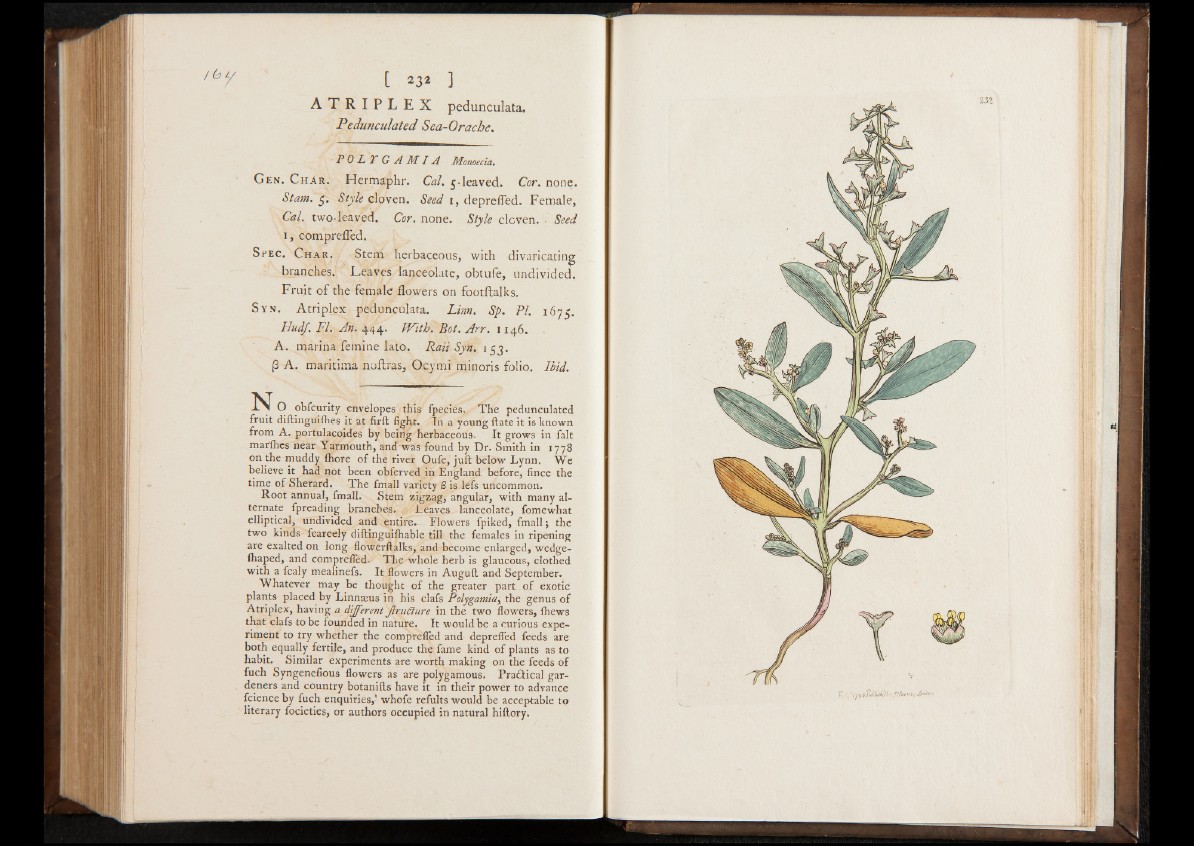
I b y
t 232 ]
A T R I P L E X p e d u n c u la ta .
Pedunculated Sea-Oracbe.
P O L Y G j i M ƒ A Mcnoecia.
G en. Char. H e rm a p h r . Cal. ^ - le a v e d . Cor. n on e .
Siam. $. Style c lo v e n . Seed i , d e p r e fle d . F em a le ,
Cal. tw o - le a v e d . Cor. n on e . Style c lo v e n . - Seed
i , com p re fle d .
S e E c . C h a r . S tem h e rb a c eo u s , w ith d iv a r ic a t in g
bran ch e s. L e a v e s la n c e o la te , o b tu fe , u n d iv id e d .
F r u i t o f the fem a le flowe rs on fo o t fta lk s .
S y n . A t r ip le x p ed u n cu la ta . Linn. Sp. PI. 1 6 7 5 .
Hud/. FI. An. 4 4 4 . With. Bot.Arr. 1 14 6 .
A . m a rin a fem in e la to . Raii Syn. 1 5 3 .
(3 A . m a ritim a n o ftra s , O c ym i min o ris fo lio . Ibid.
N O obfeurity envelopesj this fpecies.. The pedunculated
fruit diftinguifhes it at firft light. In a young ftate it is known
from A. portulacoides by being herbaceous. It grows in fait
marlhes near Yarmouth, and was found by Dr. Smith in 1778
on the muddy Ihofe of the river Oufe, juft below Lynn. We
believe it had not been obferved in England before, fince the
time of Sherard. The fmall variety /3 is lefs uncommon.
Root annual, fmall. Stem zigzag, angular, with many alternate
fpreading branches. Leaves lanceolate, fomewhat
elliptical, undivided and entire. Flowers fpiked, fmall; the
two kinds fearcely diftinguilhable till the females in ripening
are exalted on long flowerftalks, and become enlarged, wedge-
lhaped, and comprefled- The whole herb is glaucous, clothed
with a fcaly mealinefs. It flowers in Auguft and September.
Whatever may be thought of the greater part of exotic
plants placed by Linnseus in his clafs P olygamia, the genus of
Atriplex, having a different Jlruciure in the two flowers, fhews
that clafs to be founded in nature. It would be a curious experiment
to try whether the comprefled and deprefled feeds are
both equally fertile, and produce the fame kind of plants as to
habit. Similar experiments are worth making on the feeds of
fuch Syngenefious flowers as are polygamous. Practical gardeners
and country botanifts have it in their power to advance
fcience by fuch enquiries,' whofe refults would be acceptable to
literary focieties, or authors occupied in natural hiftory.